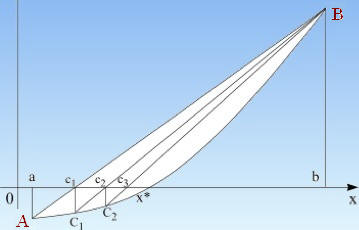Calculus I

MA1021  A'16
A'16
L e c t u r e s . . . . . Mon, Tue, Thur, Fri: 4:00 pm, SH106
C o n f e r e n c e s . . . . . . . . . . . . . Wed: 4:00 pm, SH106

How to Succeed
 Homework Assignments
Homework Assignments
 N e w s
N e w s
 Test Preview
Test Preview
I n s t r u c t o r :
Vadim V. Yakovlev
E-mail: vadim@wpi.edu
Phone: x5495
Office: SH104C
Teaching Assistant:
Wenjing Li
E-mail: wli5@wpi.edu
Office: SH204
|
Office hours:
Mon: 11:00-12:00 am
Thu: 5:00-6:00 pm
and by appointment
Office hours:
Tue: 11:00-12:00 am
Fri: 11:00-12:00 am
and by appointment
|
Course
Information
Major Course
Objective
In this course, you'll learn the basics of Differential
Calculus - the introductory topics (functions, graphs, trangent lines,
limits, etc.) and the fundamental concept of the derivative along with its
applications. By the end of the term, you will be able to work with
functions represented graphically, numerically, or analytically, understand
the meaning of the derivative and local linear approximation, and be able to
use derivatives to solve a variety of problems.
General
Information
Text: G.B. Thomas, Jr., M.D. Weir, and J. Hass, Thomas' Calculus.
Early Transcendentals, 13th Edition, 2014.
Web Site:
http://www.wpi.edu/~vadim/Calc_I/A16_Info.html
Course Structure:
- 4 regular classes a week (27 total, incl. 3 tests)
- 1 computer lab a week (5 total)
- 1 conference a week (7 total)
Main Topics:
- Introductory Concepts
- The Derivative
- Applications of the Derivative
|
|
Grading Scheme:
Maple Labs (15%, 6 x 2.5% each),
Homework-Based Quizzes (30%, 5 x 6% each),
Exams I & II (30%, 2 x 15% each)
Final Exam (Basic Skills & General Exam) (25%)
|
Quizzes, labs, and tests will have their own 30, 100, and 100 point scores
respectively. The perfect scores correspond to the presented percentages.
Point ranges (in percents) for grades are given by: A: 100% - 90%;
B: 90% - 80%; C: 80% - 70%; NR: < 70%.
Conferences
Conference meetings held to facilitate your learning and help you with the
course homework will be run under the guidance of the TA,
Wenjing Li. She will also be responsible for
three Test Preview Help Sessions (see Examinations
Section below). More info/details will be provided at the first conference.
Computer Labs
The Lab Sessions will be organized in order to let you gain
experience with Maple Computer Algebra System and its use in the problems related
to Differential Calculus. The course includes six meetings in the Computer Lab
(SH003) that will be focused on the following topics:

|
Lab 1 (Aug. 31, Sept. 1): Introduction
Lab 2 (Sept. 7, 8): Solving Equations
Lab 3 (Sept. 14, 15): Limits
Lab 4 (Sept. 21, 22): Derivatives
Lab 5 (Sept. 28, 29): Implicit Differentiation
Lab 6 (Oct. 5, 6): First and Second Derivative Tests
|
The work in the Lab will be coordinated by
Jane Bouchard and
Dina Rassias, the Maple Instructor's
Associates. Nine sections of the MA1021 labs will be run by the TAs,
Jill Resh and
Evan Witz. Each lab should be
completed and turned in during the same lab period it is introduced
(therefore, there is no make-up labs). This and other
policies/rules will be introduced and discussed in the first lab period.
Home Work &
Quizzes
Practice problems will be given for each topic covered - assigned problems
will be listed in the Homework
Assignments section. Homework is not handed in, so each student
should take a personal responsibility for doing sufficient study and
practice.
Alternatively, to evaluate your course progress, five 15-minute quizzes
will be offered throughout the course. The quiz problems will be chosen from the
homework assignments made in a few preceding classes. The quizzes will
be held in the beginning of the lecture meetings in accordance with the
Schedule of Events.
IMPORTANT: a reproduction of only final answers in the quiz
paper will result in no credit - we rather look for complete
solutions including all steps and shown in full math notation.
Examinations
Two intermediate Exams and a Final Exam will cover the course's main topics.
The Tests are scheduled for the days following the lecture consideration of the
topics covered in several preceding classes.
No laptops, gadgets, tablets, smartphones, etc. are allowed at the Tests/Exam.
Calculators are also not allowed; they in fact won't be of any help in
any of the text/exam problems.

|
The web Test
Preview will give you clear ideas about the Tests/Exam contents:
corresponding information, instructions, and sample problems (for the Tests)
will be posted two days before the event. Also, Special Test Preview
Help Sessions will take place prior to each Test and the Final:
Exam No 1: Friday, Sept 9 <=====> Test Preview: Thursday, Sept 8, 5-6 pm (SH106)
Exam No 2: Thursday, Sept 29 <==> Test Preview: Wednesday, Sept 28, 3-4 pm (SH106)
Final Exam: Wednesday, Oct 12 <=> Test Preview: Tuesday, Oct 11, 3-4 pm (HL202)
|
Bonus Points and Other
Policies
There will be opportunities to earn bonus points. Each Test will include a
bonus problem. Also, you may get bonus points for an excellent work in the quizzes
at the instructor's discretion.
When solving your tests and working on your homework problems, remember that
you are expected to SHOW ON PAPER ALL WORK IN FULL NOTATION. While calculators are
not necessary in this business, they may serve as a tool to check your
results, but not as the means to get it. Evaluations of math expressions,
limits, derivatives, etc. obtained using advanced calculators, computer algebra
systems (Maple, MATLAB, etc.), or some web engines will not be accepted.
- Please review the sample of what could be called a Perfect Quiz and follow its
style in step-by-step presentation of the solutions.
Laptops, gadgets, tablets, smartphones, etc. are consdiered a major
distraction in the lecture meetings and thus have no use there.
Adaptations &
Accommodations
If you need course adaptations or accommodations because of a disability, or if
you have medical information to share with me that may impact your performance or
participation in this course, please make an appointment with your instructor
as soon as possible you have approved accommodations, please request your
accommodation letters online through the Office of Disability Services student
portal.
If you have not already done so, students with disabilities who need to utilize
accommodations in this class are encouraged to contact the Office of Disability
Services (ODS) as soon as possible to ensure that such accommodations are
implemented in a timely fashion. This office can be contacted via email:
DisabilityServices@wpi.edu,
via phone: (508) 831-4908, or in person: Daniels Hall First Floor 124.
Academic Dishonesty
WPI's Academic Honesty policy, definitions and examples of academic dishonesty,
and other info on the subject (including explanations of the steps that will be
taken if students are suspected of violating the policy) can be found at
http://www.wpi.edu/offices/policies/honesty/; each student should familiarize
him/herself with this info. All acts of fabrication, plagiarism, cheating, and
facilitation will be prosecuted according to the university's policy. If you
are ever unsure as to whether your intended actions are considered academically
honest or not, see your instructor.
Syllabus & Schedule of Events
Week
1:
|
Intro to Calculus: Functions; graphs of functions (1.1). Operations
on functions (1.2). Trigonometric, exponential, logarithmic functions (1.3,
1.5). Direct and inverse functions (1.6). Rate of change & tangent lines
(2.1). Limits and limit laws (2.2).
|
- Lecture meetings: Aug 25, 26, 29, 30
- Conference: Wed, Aug 31
|
Week
2:
|
Intro to Calculus (cont'd): Limit: rigorous definition (2.3).
One-sides limits (2.4). Continuity (2.5). Limits involving infinity &
asymptotes (2.6). The Derivative: Concept of the derivative;
tangent line (3.1). The derivative as a function (3.2).
|
- Lecture meetings: Sept 1, 2, 6, 8
- Conference: Wed, Sept 7
- Quiz 1: Fri, Sept 2
- Test Preview Help Session #1: Thur, Sept 8
|
Week
3:
|
The Derivative (cont'd): Differentiation rules (3.3). The
derivative as a rate of change (3.4). Derivatives of trigonometric
functions (3.5).
|
- Lecture meetings: Sept 12, 13, 15
- Conference: Wed, Sept 14
- Quiz 2: Thur, Sept 15
- EXAM #1: Fri, Sept 9
|
Week
4:
|
The Derivative (cont'd): The Chain Rule (3.6). Implicit
differentiation (3.7). Derivatives of inverse functions and
logarithms (3.8)
|
- Lecture meetings: Sept 16, 19, 20, 22
- Conference: Wed, Sept 21
- Quiz 3: Thur, Sept 22
|
Week
5:
|
The Derivative (cont'd): Inverse trigonometric functions (3.9).
Related rates (3.10). Differential and linear approximations (3.11).
|
- Lecture meetings: Sept 23, 26, 27
- Conference: Wed, Sept 28
- Test Preview Help Session #2: Wed, Sept 28
- EXAM #2: Thur, Sept 29
|
Week
6:
|
Applications of the Derivative: Extreme values (4.1). The Mean Value
Theorem (4.2). Monotonic functions; the First Derivative Test (4.3).
|
- Lecture meetings: Sept 30, Oct 3, 4, 6
- Conference: Wed, Oct 5
- Quiz 4: Mon, Oct 3
|
Week
7:
|
Applications of the Derivative (cont'd): Concavity and curve
sketching (4.4). Applied optimization (4.6). Newton's Method (4.7)
|
- Lecture meetings: Oct 7, 10, 11
- Conference: Wed, Oct 12
- Quiz 5: Mon, Oct 10
- Test Preview Help Session #3: Tue, Oct 11, 3-4 pm, HL202
- Basic Skills Review: Tue, Oct 11, 7- pm, AK116
- FINAL EXAM: Wed, Oct 12, 7-9 pm, Perreault Hall Upper (FLR-UPR)
 NB: There is no class on Thur,
Oct 13. NB: There is no class on Thur,
Oct 13.
|
vadim@wpi.edu
Last modified: Thur, Aug 25, 2016

 A'16
A'16
 Homework Assignments
Homework Assignments
 N e w s
N e w s
 Test Preview
Test Preview


 NB: There is no class on Thur,
Oct 13.
NB: There is no class on Thur,
Oct 13.
![[WPI HomePage]](/Buttons/seal.gif)